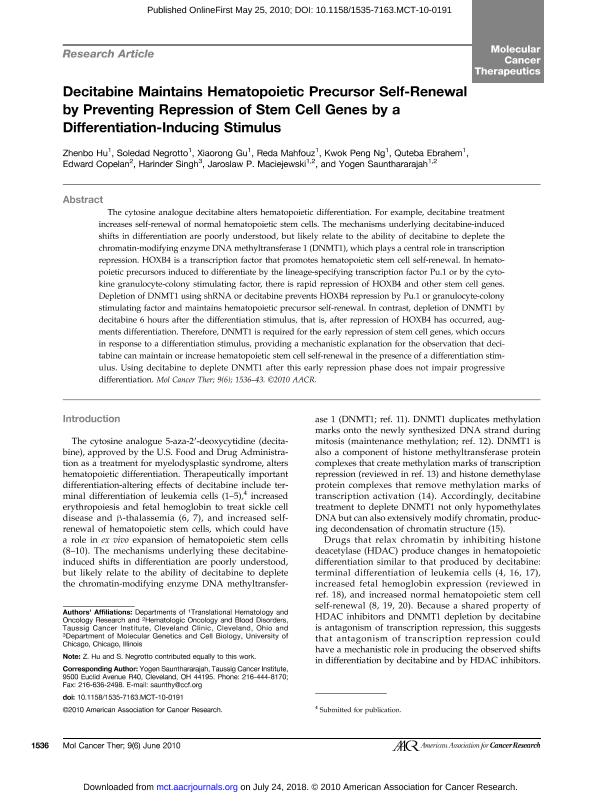Artículo
Decitabine maintains hematopoietic precursor self-renewal by preventing repression of stem cell genes by a differentiation-inducing stimulus
Hu, Zhenbo; Negrotto, Soledad ; Gu, Xiaorong; Mahfouz, Reda; Ng, Kwok Peng; Ebrahem, Quteba; Copelan, Edward; Singh, Harinder; Maciejewski, Jaroslaw P.; Saunthararajah, Yogen
; Gu, Xiaorong; Mahfouz, Reda; Ng, Kwok Peng; Ebrahem, Quteba; Copelan, Edward; Singh, Harinder; Maciejewski, Jaroslaw P.; Saunthararajah, Yogen
 ; Gu, Xiaorong; Mahfouz, Reda; Ng, Kwok Peng; Ebrahem, Quteba; Copelan, Edward; Singh, Harinder; Maciejewski, Jaroslaw P.; Saunthararajah, Yogen
; Gu, Xiaorong; Mahfouz, Reda; Ng, Kwok Peng; Ebrahem, Quteba; Copelan, Edward; Singh, Harinder; Maciejewski, Jaroslaw P.; Saunthararajah, Yogen
Fecha de publicación:
06/2010
Editorial:
American Association for Cancer Research
Revista:
Molecular Cancer Therapeutics
ISSN:
1535-7163
Idioma:
Inglés
Tipo de recurso:
Artículo publicado
Clasificación temática:
Resumen
The cytosine analogue decitabine alters hematopoietic differentiation. For example, decitabine treatment increases self-renewal of normal hematopoietic stem cells. The mechanisms underlying decitabine-induced shifts in differentiation are poorly understood, but likely relate to the ability of decitabine to deplete the chromatin-modifying enzyme DNA methyltransferase 1 (DNMT1), which plays a central role in transcription repression. HOXB4 is a transcription factor that promotes hematopoietic stem cell self-renewal. In hematopoietic precursors induced to differentiate by the lineage-specifying transcription factor Pu.1 or by the cytokine granulocyte-colony stimulating factor, there is rapid repression of HOXB4 and other stem cell genes. Depletion of DNMT1 using shRNA or decitabine prevents HOXB4 repression by Pu.1 or granulocyte-colony stimulating factor and maintains hematopoietic precursor self-renewal. In contrast, depletion of DNMT1 by decitabine 6 hours after the differentiation stimulus, that is, after repression of HOXB4 has occurred, augments differentiation. Therefore, DNMT1 is required for the early repression of stem cell genes, which occurs in response to a differentiation stimulus, providing a mechanistic explanation for the observation that decitabine can maintain or increase hematopoietic stem cell self-renewal in the presence of a differentiation stimulus. Using decitabine to deplete DNMT1 after this early repression phase does not impair progressive differentiation. ©2010 AACR.
Palabras clave:
Decitabine
,
Acute Myeloid Leukemia
,
Hematopoietic Stem Cells
Archivos asociados
Licencia
Identificadores
Colecciones
Articulos(IMEX)
Articulos de INST.DE MEDICINA EXPERIMENTAL
Articulos de INST.DE MEDICINA EXPERIMENTAL
Citación
Hu, Zhenbo; Negrotto, Soledad; Gu, Xiaorong; Mahfouz, Reda; Ng, Kwok Peng; et al.; Decitabine maintains hematopoietic precursor self-renewal by preventing repression of stem cell genes by a differentiation-inducing stimulus; American Association for Cancer Research; Molecular Cancer Therapeutics; 9; 6; 6-2010; 1536-1543
Compartir
Altmétricas



